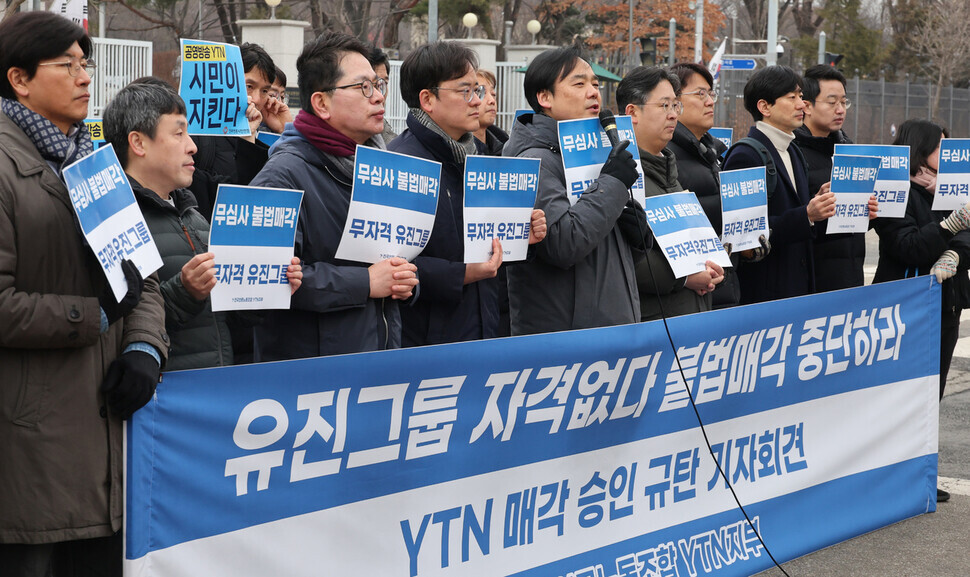hankyoreh
Links to other country sites 다른 나라 사이트 링크
[Editorial] KCC’s authorization of YTN privatization is concerning blow to public broadcasting

On Wednesday, the Korea Communications Commission (KCC) granted a request by Eugene Group subsidiary Eugene ENT to alter the majority shareholder for the YTN network.
This came 70 days after a decision in late November to defer approval, citing factors including questionable financial soundness. Eugene ENT is a special purpose corporation founded by the Eugene Group specifically for the acquisition of YTN.
The decision means that after 27 years under a public ownership structure, YTN is passing into the hands of private business interests centering on the construction industry. We must not allow the public service role of broadcasting to be compromised by its majority shareholder’s pursuit of profits.
After its establishment in 1995, YTN went through some financial difficulties owing to factors including the Asian financial crisis that erupted in 1997. It ended up taking on a public ownership structure, with KEPCO KDN and other public enterprises assuming shares.
This “quasi-public” system with a public enterprise as the majority shareholder did lend itself to certain side effects, including the appointment of pro-administration figures to the network presidency. Nevertheless, it was a foothold for YTN to achieve stable growth while maintaining a public service orientation.
But last October, the Eugene Group became the network’s majority shareholder after the public enterprise shares were sold off under the Yoon Suk-yeol administration’s plan for “improving the efficiency” of public institution assets.
The KCC moved in November to withhold its immediate approval of the change in majority shareholders, explaining that it planned to “make a decision on the approval after verifying information including plans to ensure broadcasting fairness and public responsibility as well as investment in YTN’s development.”
It has been just two months since then, and questions remain as to whether the potential problem areas mentioned by the majority shareholder alteration review committee — including “social trust” and “a lack of understanding of broadcasting affairs” — have been fully resolved.
At the time of the review, things moved so unusually quickly that some observers commented on how “rough and ready” the process was.
At a time when three of the five KCC seats are currently vacant, many critics have also said that it runs counter to the legislative aims of a consensus-based system to have important decisions that alter the very ownership structure of a network made by just two presidential appointees.
YTN is a news channel that broadcasts 24 hours a day. Fairness is its lifeblood. When it comes to broadcasting, a public service orientation is the foundation for fairness in reporting.
When management rights for a network pass into the hands of a profit-oriented private business, this raises a serious risk of it bowing to pressure not only from business interests but also political ones. This explains why the topic of YTN’s privatization has been met in the past with concerns about the possibility of it turning into a round-the-clock pro-Yoon news outlet.
The KCC has said that it provided conditions for ensuring fairness, including prohibitions of majority shareholder involvement in reporting. Even so, there is plenty of potential for interference in reporting and programming through the use of powers to appoint the CEO and other officials.
The reporting community and civil society will need to watch closely for potential abuses by the majority shareholder and the complicity of the KCC.
Please direct questions or comments to [english@hani.co.kr]

Editorial・opinion
![[Column] The miscalculations that started the Korean War mustn’t be repeated [Column] The miscalculations that started the Korean War mustn’t be repeated](https://flexible.img.hani.co.kr/flexible/normal/500/300/imgdb/original/2024/0630/9717197068967684.jpg) [Column] The miscalculations that started the Korean War mustn’t be repeated
[Column] The miscalculations that started the Korean War mustn’t be repeated![[Correspondent’s column] China-Europe relations tested once more by EV war [Correspondent’s column] China-Europe relations tested once more by EV war](https://flexible.img.hani.co.kr/flexible/normal/500/300/imgdb/original/2024/0628/7617195640940814.jpg) [Correspondent’s column] China-Europe relations tested once more by EV war
[Correspondent’s column] China-Europe relations tested once more by EV war- [Correspondent’s column] Who really created the new ‘axis of evil’?
- [Editorial] Exploiting foreign domestic workers won’t solve Korea’s birth rate problem
- [Column] Kim and Putin’s new world order
- [Editorial] Workplace hazards can be prevented — why weren’t they this time?
- [Editorial] Seoul failed to use diplomacy with Moscow — now it’s resorting to threats
- [Column] Balloons, drones, wiretapping… Yongsan’s got it all!
- [Editorial] It’s time for us all to rethink our approach to North Korea
- [Column] Why empty gestures matter more than ever
Most viewed articles
- 1[Column] The miscalculations that started the Korean War mustn’t be repeated
- 2Yoon echoed conspiracy theories about Itaewon disaster, former National Assembly speaker says
- 3S. Korea joins US, Japan for first multi-domain drills at a time of escalating tensions
- 4Moscow tells Seoul to rethink ‘confrontational course’
- 5Dreams of a better life brought them to Korea — then a tragic fire tore them apart
- 6[Editorial] It’s time for us all to rethink our approach to North Korea
- 7[Column] Balloons, drones, wiretapping… Yongsan’s got it all!
- 8[Editorial] Exploiting foreign domestic workers won’t solve Korea’s birth rate problem
- 9[Correspondent’s column] Who really created the new ‘axis of evil’?
- 10CIA record confirms US ‘completely destroyed’ Seoul’s Haebangchon in 1950 bombardment